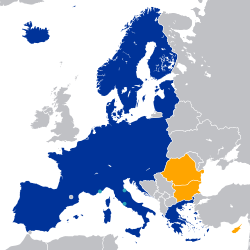In recent years, the discussion around Romania’s potential entry into the Schengen Area has gained significant momentum. While the benefits of joining are often cited, such as streamlined border controls and increased economic opportunities, the current global situation suggests that now may not be the most opportune time for Romania to take this step. Here’s why.
Geopolitical Instability
The world is going through a phase of significant instability. With rising tensions between major powers and unpredictable political shifts, the security landscape is far from stable. Joining the Schengen Area would mean relinquishing some degree of border control. In the event of a geopolitical crisis or even war, this could pose a risk. Romania would find it more challenging to control who enters the country, potentially making it vulnerable to security threats.
Economic Uncertainties
The world economy is also showing signs of fragility, with experts warning of a possible recession or even a great depression looming around the corner. In such a scenario, the freedom of movement within the Schengen Area could lead to an influx of economic migrants searching for better opportunities. This could strain Romania’s resources and infrastructure, making it difficult to manage an already precarious economic situation.
Lack of Control in Crisis
Both the above points tie into a larger issue: the lack of control Romania would have in times of crisis. Whether it’s a geopolitical conflict or an economic downturn, being part of the Schengen Area means Romania would have fewer tools at its disposal to manage its borders according to its national interests.
Delay as a Strategic Advantage
Romania has faced several delays in its efforts to join the Schengen Area, often due to political reasons rather than shortcomings in its readiness. These delays, although frustrating, offer Romania a unique strategic advantage. They provide the country with the time to strengthen its position further, both economically and politically, before making such a significant commitment. Given the ongoing challenges, Romania has the opportunity to turn the tables and make its entry into Schengen a point of strength rather than a concession.
Time for a Reassessment
The delays can also serve as a period for reassessment. Romania can take this time to evaluate the long-term implications of joining the Schengen Area critically. Is the country ready to give up a level of sovereignty for perceived economic benefits? Are the security implications fully understood and prepared for?
Conclusion
While joining the Schengen Area undoubtedly offers several advantages, the current global climate of instability and uncertainty makes it worth reconsidering the timing of such a move. Romania has the chance to turn past delays into a strategic advantage, using the time to bolster its defenses, strengthen its economy, and critically assess the long-term implications of membership. It may well be that the best course of action is to wait until Romania can join the Schengen Area from a position of strength, making it a mutually beneficial arrangement rather than a one-sided concession.
By carefully evaluating these factors, Romania can make an informed decision that serves its long-term interests, ensuring that when the time is right to join the Schengen Area, it will be for the benefit of the nation as a whole.




